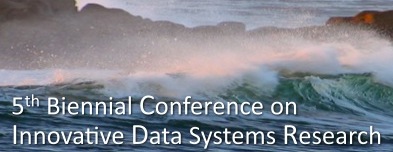 Researchers frequently lament the predictable framework of published papers. The constraints of a rigorous review process discriminate against unconventional work and ideas that are innovative but not yet fully worked out. As part of its mission to identify major new research opportunities, the CCC is sponsoring a series of “wacky ideas” sessions at several conferences. The goal of these sessions is to break free of the shackles of the normal reviewing process while still requiring a paper. In this way, the “wacky idea” sessions differ from a “midnight session” of informal talks, in that the paper allows the ideas presented to be more broadly accessible.
Researchers frequently lament the predictable framework of published papers. The constraints of a rigorous review process discriminate against unconventional work and ideas that are innovative but not yet fully worked out. As part of its mission to identify major new research opportunities, the CCC is sponsoring a series of “wacky ideas” sessions at several conferences. The goal of these sessions is to break free of the shackles of the normal reviewing process while still requiring a paper. In this way, the “wacky idea” sessions differ from a “midnight session” of informal talks, in that the paper allows the ideas presented to be more broadly accessible.
The first of these sessions were held last summer at PLDI and last fall at OSDI. Now, the CCC has sponsored a third session, this time at the Conference on Innovative Data Systems Research (CIDR). The CIDR conference, which began in 2003, is a database conference that seeks papers about innovative and risky approaches, systems-building experience, killer applications and “war stories,” experimental studies, unsolved technical challenges, provocative position statements, and other off-the-beaten-path papers on the architecture and implementation of data-centric systems. As such, the conference itself already goes part way towards addressing the CCC’s “wacky ideas” initiative. Nevertheless, for the 2011 conference, CIDR added a CCC-sponsored “Outrageous Ideas and Visions” (OIV) track that focused on long-term challenges and opportunities for the database and data management communities that are outside of current mainstream research in the field. Of particular note, the OIV track allowed for papers that lack any grounding in current or near-term practice or that address issues currently getting insufficient attention from the field.
A subcommittee of the CIDR program committee reviewed the OIV submissions and accepted 12 papers that introduced new application domains, new approaches to old problems, and new ways of thinking about data. From these, three were chosen as CCC award-winners (receiving travel awards of varying amounts):
First place
Towards a one size fits all database architecture
by Jens Dittrich and Alekh Jindal (Saarland University)
Noting the use of various types of data stores: column-store database systems, stream-oriented database systems, traditional row-oriented database systems, and others, this paper proposes a new architecture for database systems that can (it is claimed) serve the purpose of all of these distinct data-stores based on views on a log-based storage model.
Second place
Data in the last mile
by Kuang Chen, Joe Hellerstein, and Tapan Parikh (University of California, Berkeley)
The last mile of a data service can also be the first mile for set of data sources. This “first mile” is a huge challenge is underdeveloped nations. This paper discusses techniques for data collection in such environments and describes actual experience with public-health organizations in sub-Saharan Africe.
Third place
Computational journalism
by Sarah Cohen (Duke University), Chengkai Li (University of Texas at Arlington), Jun Yang (Duke University) and Cong Yu (Google)
Newspapers are reducing the number of reporters devoted to investigational journalism , largely as a result of changes arising from digital media. These same changes enable a mass collaboration of investigational journalism and concerned citizens. The paper describes how collaborative efforts can be directed towards this new problem of finding questions as opposed to finding answers.
Each of OIV papers stimulated strong questioning and polarized opinions — exactly our aim in creating these sessions. The winners were selected via a ranking by the attendees. Every paper has at least several strong supporters –and at least several strong opponents. It is our hope that such strong opinions lead to further “outside the box” thinking and bring even more vitality to the field.
The full CIDR proceedings are available at http://www.cidrdb.org/cidr2011/index.html.
(Contributed by Hank Korth, Lehigh University)










Hello
Sir
I want to do German language course to your organization.
I am graduate person from Pakistan.
Please tell me what i do.
Please give admission in your university.
Thanks
Regards,
Muzamil
+923314034840
rana_muzamill@Hotmail.com
Lahore, Pakistan